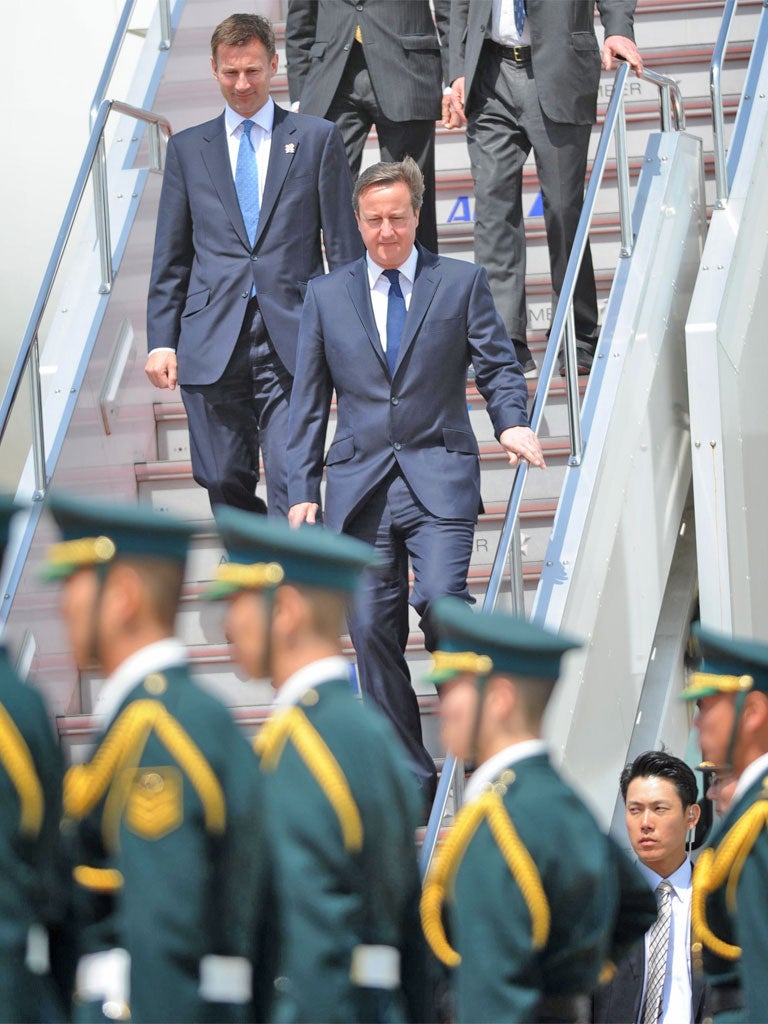Row with Clegg over 'snooping Bill' mars Cameron's trip to Asia
Prime Minister vents anger at Lib Dem's public dissent and calls for 'patience' on detail of plans for secret courts

Your support helps us to tell the story
From reproductive rights to climate change to Big Tech, The Independent is on the ground when the story is developing. Whether it's investigating the financials of Elon Musk's pro-Trump PAC or producing our latest documentary, 'The A Word', which shines a light on the American women fighting for reproductive rights, we know how important it is to parse out the facts from the messaging.
At such a critical moment in US history, we need reporters on the ground. Your donation allows us to keep sending journalists to speak to both sides of the story.
The Independent is trusted by Americans across the entire political spectrum. And unlike many other quality news outlets, we choose not to lock Americans out of our reporting and analysis with paywalls. We believe quality journalism should be available to everyone, paid for by those who can afford it.
Your support makes all the difference.A split between David Cameron and Nick Clegg widened last night over the Government's controversial "Big Brother" plan to monitor people's use of the internet.
Travelling to Japan, the Prime Minister made clear his irritation with the Liberal Democrats' public opposition to allowing the security service to obtain details of messages sent via Skype and social networks and for some courts to sit in private to hear sensitive intelligence material. He said Lib Dem ministers, including Mr Clegg and Chris Huhne, the former Energy and Climate Change Secretary, had sat on the committees which backed the plans.
As the open divisions at the top of the Coalition threatened to overshadow Mr Cameron's trade mission, Mr Clegg took the unusual step of denying Mr Cameron's suggestion that he had signed up to what critics have dubbed a "snooper's charter."
Allies said Mr Clegg acknowledged the need to consider changes to keep pace with new technology but that he has not approved any specific plans because the Home Office has not yet brought them forward. They said any plans would have to pass three tests – that they are necessary, proportionate and have adequate safeguards to preserve the balance between security and liberty.
Mr Clegg's spokesman said: "The Deputy Prime Minister agreed at the NSC [National Security Council] that the government would look at proposals to address the police's technological gap to deal with serious criminals and terrorists. But he also made clear that they could only proceed if they took into account and protected civil liberties."
He added: "The Liberal Democrats will continue to put the protection of civil liberties at the top of the political agenda as the Coalition Agreement makes clear."
Downing Street is annoyed that Mr Clegg wrote to fellow ministers on the NSC raising concerns about the creation of the "secret courts" and then invited civil liberties groups to challenge the "Big Brother" plan.
Mr Cameron told journalists: "I think everyone needs to be patient. They need to see what is proposed, both in terms of the [secret] court issue and in terms of telephone calls and emails. Why would we be doing this in a Cabinet of Conservatives, including quite a lot of liberal Conservatives, and Liberal Democrats, if there wasn't a problem?"
He added: "I think when people see the detail they will understand this is a very sensible way of keeping up with technology and not a snoopers' charter."
Defending the "secret justice" plans, the Prime Minister said: "We have a problem in which you can have people coming and claiming money off the British state and there is absolutely no way of the state defending itself in court.
" I think anyone who is reasonable – who understands that national security matters, who understands that being able to present intelligence in court matters – I think they will find favour with these proposals. But it will be a difficult argument. These things always are."
UK executives in Burma only 'sightseeing'
British businessmen on David Cameron's trip to south-east Asia have been told they will not have the chance to capitalise on his visit to Burma to drum up investment opportunities.
Government sources said the businessmen would be forced to "kick their heels" during the one-day visit while Mr Cameron meets President Thein Sein and holds talks with opposition leader Aung San Suu Kyi.
A sightseeing tour has been laid on for chief executives and chairmen eager to exploit opportunities. But Downing Street is thought to be sensitive to accusations of pre-empting an EU decision on reviewing sanctions against the country.
Join our commenting forum
Join thought-provoking conversations, follow other Independent readers and see their replies
Comments